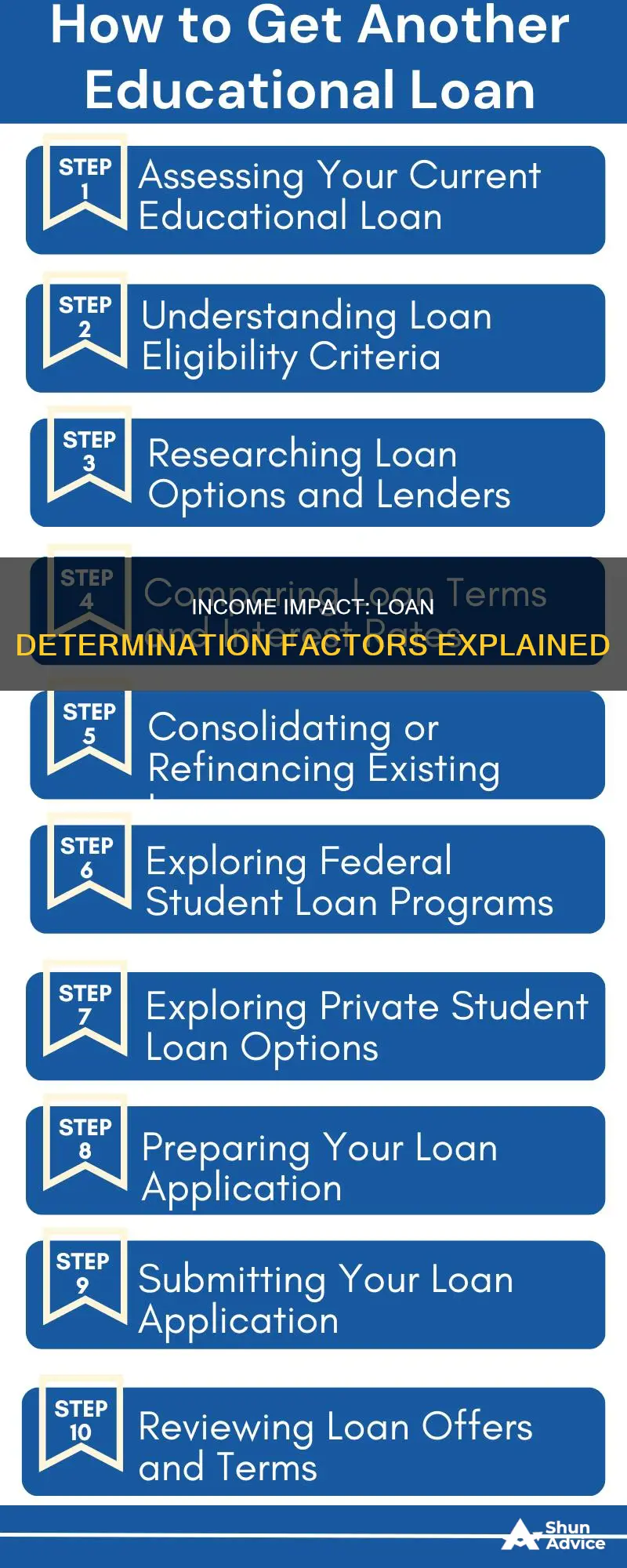
Income is a key factor in loan determination. Lenders want to ensure that you have enough income to keep up with monthly payments and not default on your loan. They are required by law to make a reasonable, good faith determination of your ability to repay. Lenders will examine your finances in detail, including your income level and debt obligations, to determine the maximum amount they are willing to lend you. Your income may also impact the interest rate you are charged, with higher rates for riskier borrowers. Different lenders have different requirements, and it's important to understand how your income will affect your loan prospects.
| Characteristics | Values |
|---|---|
| Loan Type | Personal Loan, Mortgage Loan, Credit Card Application |
| Income Streams | Salary, Wages, Rental Income, Investment Income, VA Benefits, Military Income, Retirement Income, Social Security Income, Self-employed Income, Freelance Income, Gambling Winnings |
| Lender Considerations | Income Stability, Income Amount, Debt Obligations, Applicant's Ability to Repay, Credit Score, DTI Ratio, Application Completeness, Supporting Documentation |
| Tax Implications | Personal Loans generally not taxable income unless forgiven; Interest on Personal Loans may be tax-deductible if used for business; Forgiven loans over $600 are taxable income |
What You'll Learn

Lenders assess your ability to repay
Each lender and loan program has its own requirements, including the types of income that qualify and the length of time you must have earned that income. For example, full-time employment is the most common type of income for home buyers, and you will usually need to provide documentation such as recent pay stubs and one to two years of income tax returns to verify. If you are self-employed, you will typically need to provide a two-year track record of successful earnings. Lenders will average the income if it's going up and take the lower figure if it's decreasing. You'll only be able to count your taxable income after deductions, with a few exceptions for depreciation, depletion, and expenses that won't recur.
If you have multiple income streams, approval can be more complicated. In this case, the lender has to verify each income stream individually to ensure you'll continue at the same total income level for years to come. Other types of income that can be used to qualify for a mortgage include rental or investment income, VA benefits, and military income such as allowances for housing and food. If your retirement includes savings in an IRA, 401(k), or other retirement accounts, you can use this as income to qualify for a mortgage. Underwriters will start with 70% of your retirement balances to account for fluctuations and then divide your total by the number of months in your mortgage. Social Security income from the government, including retirement or long-term disability benefits, is usually accepted as income for mortgage purposes. However, if you're receiving benefits on behalf of a family member, you'll need to show that the income will continue for at least the next three years.
Homeowner Insurance: Loan Price Coverage Explained
You may want to see also

Low income may lead to rejection
Income is a key factor in loan determinations. Lenders want to ensure that you have enough money coming in to keep up with your monthly payments and not default on your loan. If you have a low salary or unstable income, the lender may not want to take a chance on you.
Lenders will also consider your debt-to-income (DTI) ratio, which compares your monthly debt payments to your income. A high DTI ratio may lead to rejection, as it indicates that you may not be able to afford the additional debt of a loan. Lenders may also reject your application if you have provided incorrect or incomplete information on your application, such as missing supporting documentation like bank statements or tax returns.
Some lenders publish minimum income requirements, and it is worth checking these before applying for a loan. Lenders will also consider your income sources and the length of time you have been earning that income. For example, self-employed borrowers typically need a two-year track record of successful earnings to apply for a mortgage.
If you have a low income, you may be able to increase your chances of loan approval by improving other aspects of your financial situation. This could include increasing your income, paying off existing debt, or considering a less expensive purchase. You could also search for a lender that is upfront about their minimum income qualifications to find one that is a better match for your financial situation.
How Bonuses Affect Loan Eligibility and Income Assessment
You may want to see also

Multiple income streams complicate approval
Multiple income streams can bolster your financial stability and strengthen your loan application. However, they can also complicate loan approval. Here are some reasons why:
- Fluctuating Income: Multiple income streams may include sources such as freelance work, investments, or gig work, which can lead to fluctuations in monthly or annual income. Lenders typically prefer stable and consistent income sources with a track record of reliability. When applying for a loan, you may need to explain income fluctuations and demonstrate how you manage variability to maintain financial stability.
- Documentation and Verification: When applying for a loan, you will need to provide comprehensive documentation for all your income streams. This may include pay stubs, tax returns, bank statements, rental agreements, investment statements, and invoices from freelance work or side gigs. Lenders will scrutinize these documents to verify your income, and inconsistent or insufficient documentation may lead to delays or rejection of your loan application.
- Complexity of Financial Management: Managing multiple income streams can be overwhelming, requiring careful tracking and budgeting. It involves monitoring multiple cash flows, budgeting for various income amounts, fulfilling added tax obligations, and potentially managing multiple bank accounts. Proper financial management is crucial when applying for a loan, as lenders will assess your overall financial situation and ability to repay the loan.
- Income Stability and Risk Assessment: Lenders assess loan applications based on the stability and predictability of income. Multiple income streams may include sources with varying levels of stability. For example, investment income or gig work can be unpredictable. Lenders may view such income streams as riskier than traditional employment income. As a result, they may require more extensive documentation or apply stricter criteria when evaluating your loan application.
- Meeting Lender Criteria: Different lenders have varying criteria for loan approval. Some lenders may prefer borrowers with more straightforward income structures. They might impose specific requirements or have a preference for certain types of income. Multiple income streams could impact your eligibility or the terms offered by particular lenders.
To improve your chances of loan approval with multiple income streams, ensure you have a solid understanding of your financial situation. Maintain comprehensive records, provide thorough documentation, and be prepared to explain any fluctuations or unique aspects of your income sources.
Mshda's 203(k) Loan Permission: A Guide to Renovation Loans
You may want to see also

Lenders verify income streams individually
Lenders need to verify that you have enough money coming in to keep up with your monthly loan payments. If you have a low salary or unstable income, the lender may not want to take the risk. Lenders will often publish minimum income requirements, and after looking at your financials, they will determine the maximum amount they are willing to lend you. This figure is based on how much you can comfortably afford to repay each month, taking into account your current income level and debt obligations.
Lenders will often require you to submit supporting documentation, such as W2s, bank statements, or tax returns, to verify your income. This is especially true for those with multiple income streams or more complicated financial situations. Lenders must verify each income stream individually to ensure that you will continue at the same total income level for years to come. This process can be more complicated and may take longer.
If you are self-employed, you will typically need to provide a two-year track record of successful earnings to apply for a mortgage. Lenders will average the income if it is increasing and take the lower figure if it is decreasing. You will only be able to count your taxable income after deductions, with a few exceptions for depreciation, depletion, and expenses that will not recur.
Lenders may also use income modelling algorithms to estimate your earnings, especially if they do not have access to your tax documents and other verification. These algorithms use your credit report information to estimate your income and are a quick way for lenders to assess your financial standing.
Retirement Savings: Mutual of America's Loan Policy Explained
You may want to see also

Income from retirement savings can be used
Income is a key factor in loan determinations. Lenders want to ensure that you have enough money coming in to keep up with your monthly payments and that you don't default on your loan. If you have a low salary or unstable income, the lender may not want to take the risk.
Retirement savings can be used as income to qualify for a loan. If you've decided that taking money from your retirement savings is the best option, you'll need to submit a request for a 401(k) loan or withdrawal. The maximum amount that can be taken as a loan is generally the greater of $10,000 or 50% of your vested account balance, or $50,000, whichever is less. For example, if a participant has an account balance of $40,000, the maximum amount they can borrow from the account is $20,000. It's important to note that any new loan, when added to the outstanding balance of all other loans from the plan, cannot exceed the plan maximum.
There are a few things to keep in mind when considering a loan from your retirement savings. Firstly, if you borrow from an IRA, the entire value of the IRA is included in the owner's income. Secondly, hardship withdrawals from 401(k) accounts are generally taxed as ordinary income, and there may be an early withdrawal penalty of 10% if you're under 59 and a half years old. Thirdly, you'll have to pay back the borrowed money, plus interest, within a specified period, usually five years. Finally, keeping up with regular contributions during the loan period is essential to maintaining your retirement strategy.
When applying for a loan, it's important to provide complete and accurate information, including supporting documentation such as bank statements or tax returns. Lenders use this information to make their loan decisions and determine the maximum amount they are willing to lend. It's also worth noting that lenders may impose restrictions on how loan funds can be used. For example, many lenders don't allow their personal loans to be used for education costs or business expenses.
Mudra Loan Subsidy: What Borrowers Need to Know
You may want to see also
Frequently asked questions
Yes, your income can affect a loan determination. Lenders will want to ensure that you have enough money coming in to keep up with your monthly payments and that you can afford your loan payments for many years to come. They will also want to make sure that you can comfortably afford your monthly payments, so your income is important.
You will need to provide supporting documentation, such as W2s, bank statements, or tax returns. This information will help the lender make their decision.
A DTI ratio is a measurement of the percentage of your monthly income (before taxes and other withholding) that you spend on debt payments. Typically, to qualify for a mortgage loan, your DTI ratio should be no greater than 43%, and many lenders require a DTI ratio of 36% or less.
A credit score is a metric used by lenders to determine how likely you are to repay your debts. It is based on several factors, including payment history, credit utilization ratio, and the age of your oldest form of credit. A higher credit score indicates that you are more likely to be approved for a loan and receive a lower interest rate.







